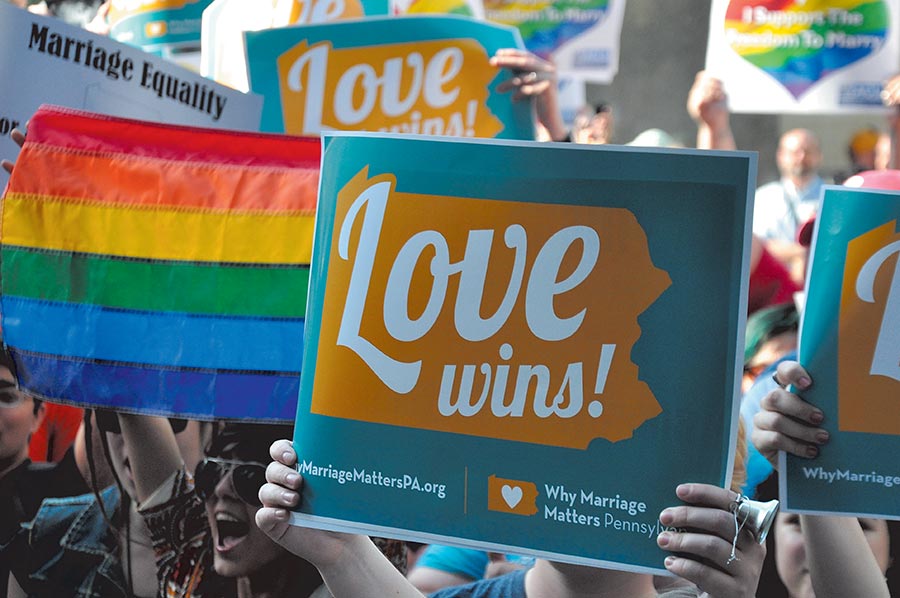Pennsylvania is eight months out from the landmark court decision that legalized same-sex marriage in the Keystone State — but there are still a number of legal issues that have yet to be resolved that could prove problematic for same-sex couples.
The May 20 decision by U.S. District Judge John E. Jones 3d mandated that Pennsylvania both allow same-sex couples to marry and recognize legal marriages performed in other states — but, for same-sex couples who had been joined in other legal ways, the waters remain murky.
“Many people got civil unions, because that’s what available some places before marriage, and California had a domestic-partner registry as did a few other states,” explained attorney Tiffany Palmer, of Jerner & Palmer PC. “So the question is, will the courts in Pennsylvania see these as the equivalent to marriage or not? If you’re dissolving your union, is it done in Family Court or a different court? These are some of the issues we’re grappling with now.”
Palmer said her firm has a case before the Philadelphia Family Court of a same-sex couple looking to dissolve a civil union, and another that was in the Bucks County court system that ultimately had to be settled in Vermont, which offered civil unions before legalizing same-sex marriage.
“Even though people might think it should be simple — if you have a civil union, it should be able to be dissolved like a marriage — there have been complications,” said Thomas Ude, legal and public policy director at Mazzoni Center. “Some clerks have been pointing to each other as the place to file, whether it should be in Family Court like with a divorce of a marriage, or handled differently.”
Since such questions have just started to be asked in the past few months, there is no clear precedent yet in Pennsylvania.
“It’s all on a case-by-case basis,” Palmer said. “We don’t really have any direction from the appellate courts yet because no one’s taken it up on appeal; everything has been on the trial and family-court levels. So I’m hoping eventually there will be some more guidance statewide.”
Those who received marriage licenses in Montgomery County last summer — during a short window in which Bucks County Register of Wills D. Bruce Hanes was issuing them — are also in limbo. Same-sex couples who were involved in a lawsuit seeking recognition for those marriages were able to negotiate a settlement, yet couples who were not parties in the suit are still seeking resolution.
Another area where questions abound is parentage rights.
Parentage laws vary by state, and some dictate that the spouse of a parent who has conceived a child through assisted reproduction, with an anonymous sperm donor, is also a legal parent. However, Pennsylvania has no such statute.
“There’s no statutory guidance at all,” Palmer said. “So other than having a biological connection, giving birth, or adopting a child, it’s very unclear what other bases for being a parent would be. Case law essentially holds that, if you’re not genetically related, and if that relationship is no longer intact, it could be determined that you’re not a parent.”
Palmer noted that the lack of national uniformity in parentage laws has been exploited in custody battles.
“The worst cases we’ve seen coming out of this context is where one partner has taken advantage of the laws, say where the biological parent moves to a state that may be hostile to same-sex couples to basically take the child away from the other person,” she said. “It’s the laws of the state where the couple is separating at, not where the child was born, that applies.”
A lot of these issues, Palmer noted, can be avoided through stepparent adoption for assisted-reproduction cases. Before Pennsylvania adopted marriage equality, same-sex couples had to undergo a second-parent adoption to both become legal parents to a child produced from assisted reproduction. Now, however, they can file for a stepparent adoption, which Palmer noted is less time-consuming and costly.
While some of the parentage-related challenges could be addressed through the legislature adopting a form of the Uniform Parentage Act, Palmer said, pressing for legislative reforms in this realm at this time may be unadvisable.
“When conservatives legislate, they tend to make things more restrictive,” she said, noting that the New York legislature banned gestational surrogacy, an option often utilized by same-sex male couples. “If surrogacy was outlawed, that would be horrible for so many same-sex couples, many who come from all over the world to Pennsylvania for surrogacy. Without legislation you have fewer restrictions; ideally it would be nice to have statutory guidance, but given our legislative makeup, I could see it as potentially making things worse.”
The legislature could play a role in banning LGBT discrimination. Ude noted federal nondiscrimination law has at times been interpreted to include protections based on sexual orientation and gender identity, but a state statute is needed.
“Those are all good trends,” Ude said. “But, there are employers who discriminate because they want to, and employers who discriminate because they don’t realize it’s actually illegal to discriminate. The more explicit the laws, the easier it is for us to educate employers so they can’t claim ignorance. Without these protections, people are vulnerable to having to fight battles they shouldn’t have to face in the first place.”
